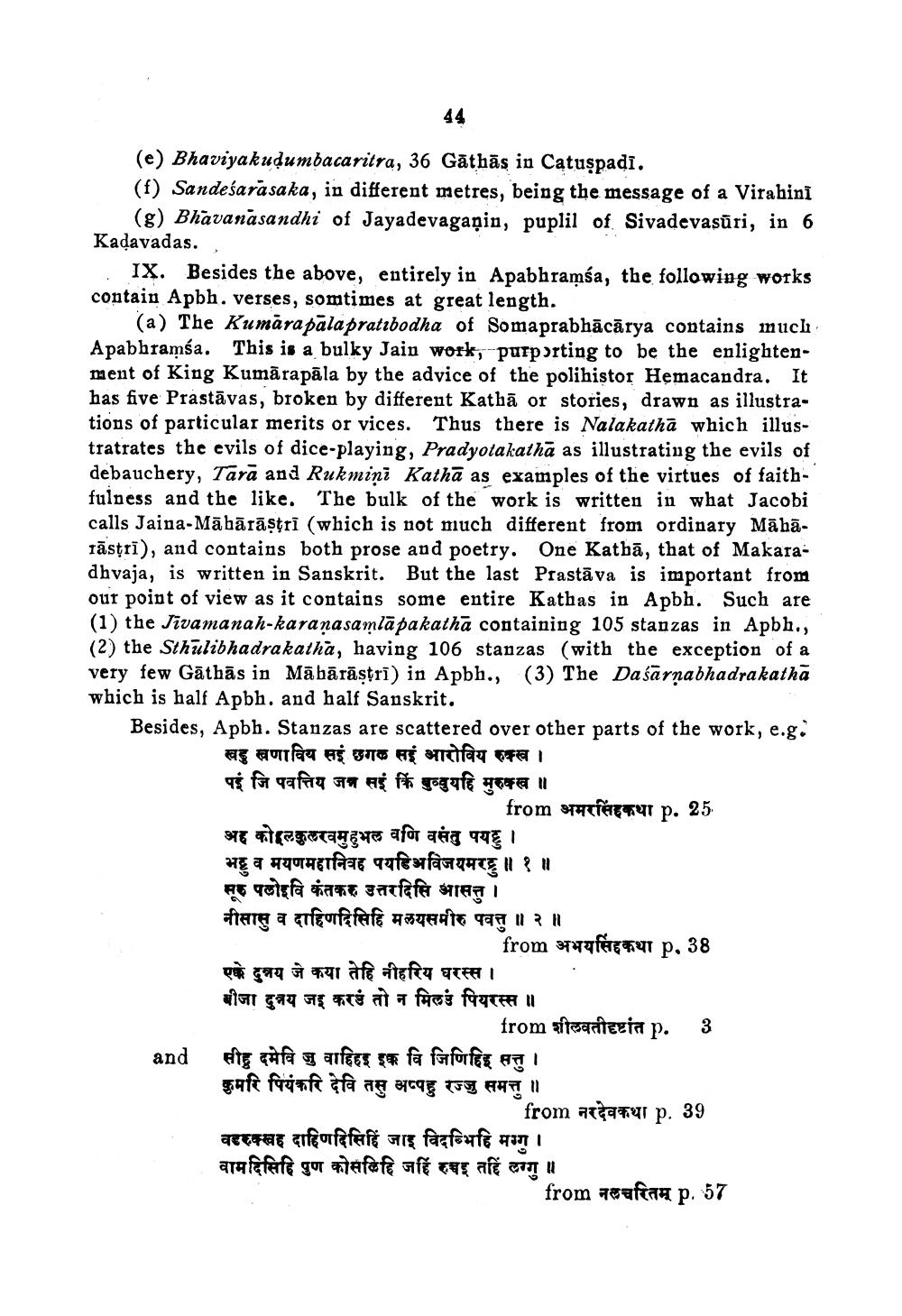________________
44
(e) Bhaviyakudumbacaritra, 36 Gāthās in Catuspadi.
(f) Sandesarāsaka, in different metres, being the message of a Virahinī (g) Bhavanāsandhi of Jayadevaganin, puplil of Sivadevasūri, in 6 Kadavadas.
IX. Besides the above, entirely in Apabhramsa, the following works contain Apbh. verses, somtimes at great length.
It
(a) The Kumarapalapratibodha of Somaprabhācārya contains much Apabhramsa. This is a bulky Jain work, purporting to be the enlightenment of King Kumarapala by the advice of the polihistor Hemacandra. has five Prastavas, broken by different Katha or stories, drawn as illustrations of particular merits or vices. Thus there is Nalakatha which illustratrates the evils of dice-playing, Pradyotakatha as illustrating the evils of debauchery, Tara and Rukmini Katha as examples of the virtues of faithfulness and the like. The bulk of the work is written in what Jacobi calls Jaina-Mahārāṣṭri (which is not much different from ordinary Mahārāstrī), and contains both prose and poetry. One Kathā, that of Makaradhvaja, is written in Sanskrit. But the last Prastava is important from our point of view as it contains some entire Kathas in Apbh. Such are (1) the Jivamanah-karanasamla pakatha containing 105 stanzas in Apbh., (2) the Sthulibhadrakatha, having 106 stanzas (with the exception of a very few Gāthās in Mahārāṣṭri) in Apbh., (3) The Dasarṇabhadrakatha which is half Apbh. and half Sanskrit.
Besides, Apbh. Stanzas are scattered over other parts of the work, e.g.
खड खणाविय सई छगल सई आरोविय रुक्ख । पई जि पवत्तिय जनसई किं बुव्वुयहि मुरुक्ख ॥
and
from अमरसिंहकथा
अह कोलकुलरवमुभल वणि वसंतु पयहु । भट्ट व मयणमहानिवह पयडिअविजयमरद्रु ॥ १ ॥ सूरु पलोइवि कंतकरू उत्तरदिति आसत्तु । नीसासु व दाहिणदिसिहि मलयसमीरु पवत्तु ॥ २ ॥
एके दुन्नय जे कया तेहि नीहरिय घरस्त । बीजा दुनय जइ कर तो न मिलउं पियरस्त ॥
P.
from अभयसिंहकथा p. 38
25.
areer दाहिणदिसिहिं जाइ विदभिहि मग्गु । वाम दिसिहि पुण को विहि जहिं रुचइ तहिं लग्गु ॥
from शीलवतीदृष्टांत P. 3 सी दमेव जु वाहिर इक वि जिणिहि सत्तु । कुमरि पियंकरि देवि तसु अप्पहु रज्जु समत्तु ॥
from नरदेवकथा p. 39
from toचरितम् p. 57




